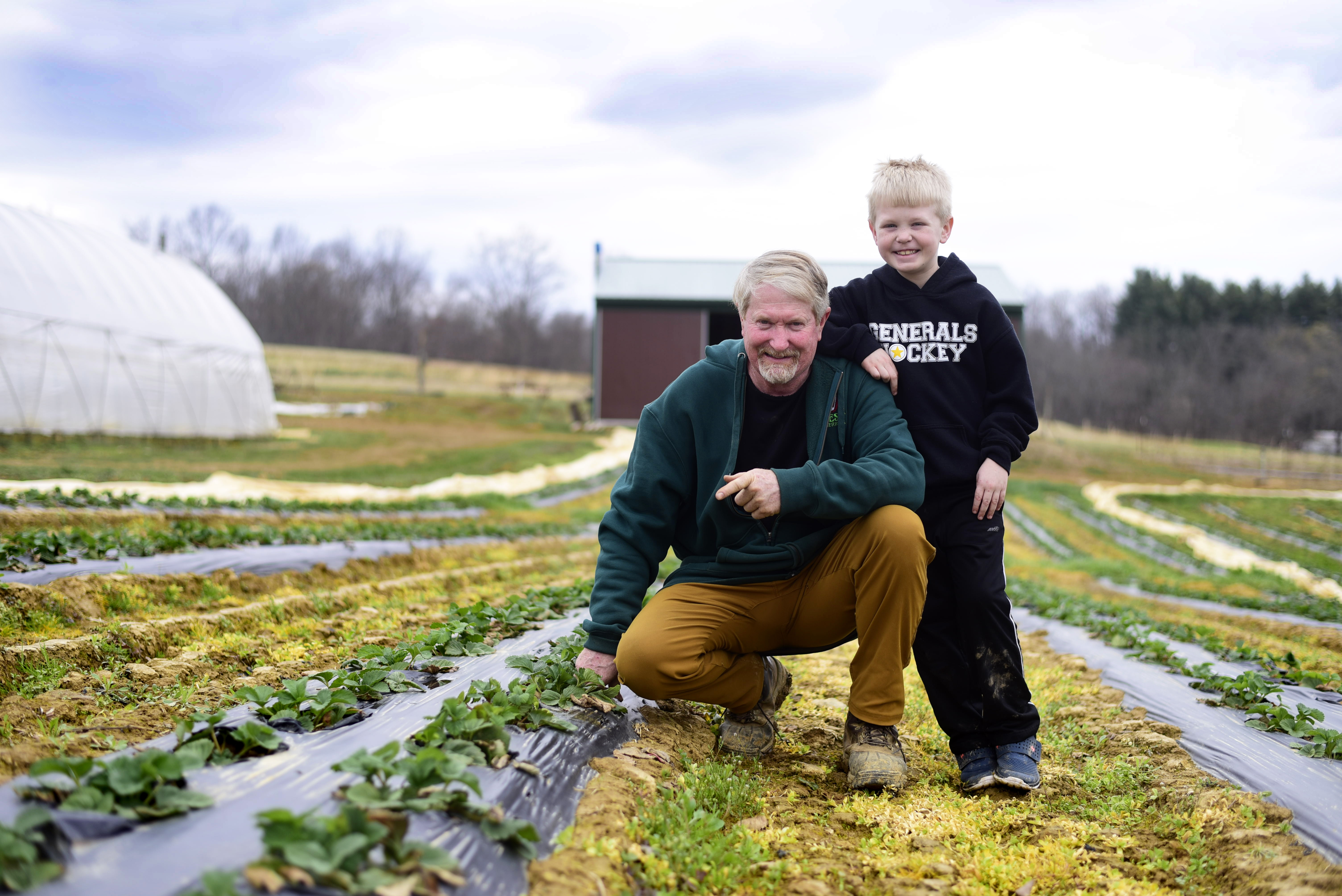
Rick Vest wakes up as soon as the sun rises, puts on zip-off, quick-dry pants and a long-sleeved shirt and pulls on his black boots. Sometimes he wears a big hat to protect his head and face from the sun.
Outside, he continues to clean up the remains of last fall’s harvest, plowing his small fields and taking covers off the young strawberry plants. He thinks of the other tasks he must complete: repair the high tunnels that keep some of his crops warm throughout winter, repair the fence surrounding the small farm and test the soil.
“You never run out of things to do,” Vest says.
Rick and his wife, Terry, have owned Vest Berries since the early ‘80s. In one of their first years working the farm, everything was so wet it was challenging to accomplish anything. Rick recalls that he learned a lot that season. He also remembers 1988 was so hot that their strawberries never even grew.
Like many small, independent farmers, Rick has always battled the weather. Every morning, he opens his smartphone to check whether it will be humid, rainy, sunny or cloudy that day.
“You have to know what’s the weather going to be like every day,” Terry said. “High, low rain, humidity, every day. You have to be almost a professional weather meteorologist.”
“To anyone wanting to get into this, and I call it a game, because it’s a gamble. It’s like going to Vegas,” Rick says. “You can stick a lot of money into it, and you may not get any money out of it.”
But for Rick, farming is like second nature, he says.
Growing up in Harrison, Rick would grow sweet potatoes in jars under his bed. He watched his grandfather and his own father grow a little bit of everything; his parents were raised in the Great Depression and grew almost everything they ate. He started gardening with his family when he was 7 or 8 years old.
“Once you get it in your blood, it’s hard to get it out,” Rick says.
When he was 11 or 12, he worked for a large produce farm near his house, where he learned how to farm on a more commercial level. He recalls carrying his basket of sweet corn and wondering why he was only making a quarter an hour.
Rick eventually left Harrison and went to Hocking College to study wildlife management and law enforcement. There, he met Terry, who was studying nursing. Terry grew up in the area, and her parents owned about 80 acres of land, some of which they used for growing hay and raising cattle, but most of the property was untilled.
After Rick and Terry got married in 1978, they both worked — Rick in the printing industry and Terry as a nurse.
They started a small, U-pick strawberry operation in the early 1980s, where people could pick strawberries and pay per pound or container. The Vest family soon became known for their strawberries, an honor still present.
“I’ll be at work and people will say, ‘Are you the lady who has the strawberries?’ It’s the claim to fame,” Terry says.
After working in the printing industry for 25 years, Rick decided to dedicate his time solely to the farm.
Today, while strawberries contribute to half of the farm’s income, Rick grows a variety of other produce, including sweet potatoes, asparagus, beets, carrots, cabbage and potatoes.
Every Saturday, Rick gets up at 6 a.m. to prepare for the Athens Farmers Market, and Terry joins him later at the market. They know almost everyone who meanders through the stalls. Rick and Terry love seeing and chatting with the different customers and watching their customers’ children grow. Through the years, they have seen multiple generations come to both the market and their strawberry fields.
“That’s rewarding, and they keep coming back and you talk,” Rick says. “They’re just like family.”
During most winters, Rick replants different vegetables of late-2018, early-2019 months. Normally this gets done in January, but this year he is a little bit behind due to the wet weather.
Rick is not so sure how this season will turn out for him. Fortunately he can grow some produce indoors in high tunnels during the winter, and a decent portion of his land has adequate drainage. But sometimes there still isn’t much he can do. When it’s dry, he can still plant, but when it’s muddy, cultivating is impossible.
“Farming is something that it’s a learn-as-you-go, but the learning experience hurts and it’s costly,” Rick says. “When you did something wrong one year and you don’t get any income off that year, it hurts both mentally and physically.”
The weather may be somewhat unpredictable, but he’s grateful that he lives here in Ohio and not in a place where he might encounter hurricanes, tornadoes or more snow. It could always be worse, he thinks. Whatever weather the clouds bring in, he can adjust the way he farms.
“You try to adapt the best you can and plan for it,” Rick says. “Every year you try to plan for things like that. You plan for the worst and hope for the best.”